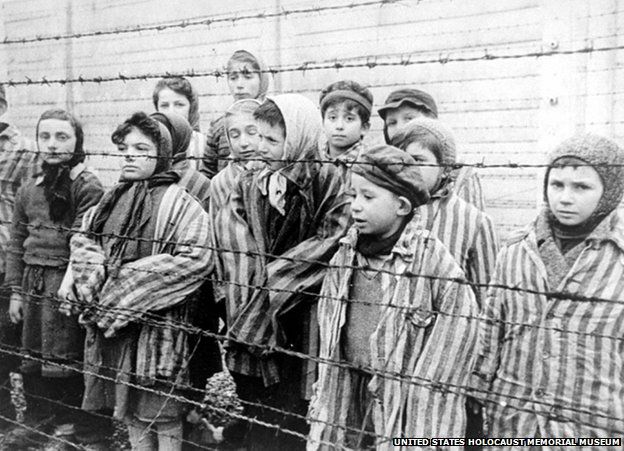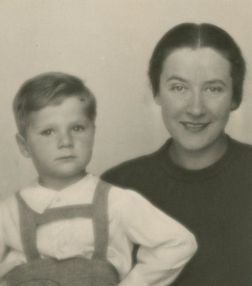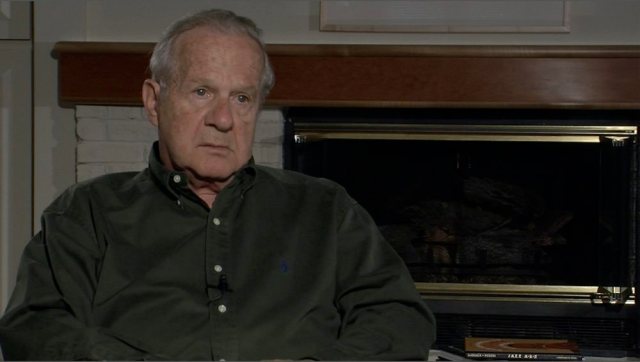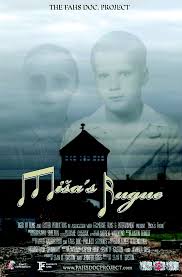
Young prisoners in Auschwitz
Frank Grunwald was just 12 years old when he and his family entered the concentration camps. Terezinstadt, Auschwitz, Melk, Mauthausen . . . he was in them all. Unfortunately, neither his brother nor his mother would leave Auschwitz alive.
Frank was born in Czechoslovakia in 1932. His father was a doctor, as well as being a very talented photographer. Both of his parents, Kurt and Vilma, were musicians and instilled a love of music into Frank and his brother, John, who was four years his senior.
The family lived a comfortable life in Prague. Growing up, Frank liked art – he focused on it, as he did playing the accordion. For him, the instrument’s melancholy sound was both personal and human.
The notion of being Jewish never really entered Frank’s head. He was just a Czech, like his fellow citizens – but not in the eyes of the Nazis who invaded in 1939. Less than two years later, the Grunwalds were wearing yellow stars and being forced to move from their large home to a small apartment. They endured intimidation, prejudice and social ostracisation. Then things really got tough.

Frank with his mother, Vilma
First the family were sent to the ghetto of Terezinstadt, then they were transported to Auschwitz in cattle wagons holding up to one hundred people. Upon their arrival, Frank’s mother was placed in the female quarters.
He barely survived the selection process overseen by the ‘Angel of Death’, Josef Mengele, who decided whether people should live or die by placing them to the left or to the right of a table. Frank and his brother, John, were told to stand at the left. Neither knew this meant a death sentence.
Eight seconds changed everything…
…That’s how long it took for a brave prisoner to step forward and quickly shove Frank into the queue on the right. John was not so fortunate.
When their mother learned that her eldest son had been selected to die, she decided to join him – not wanting him to face death alone. She scribbled a hasty note just as the trucks arrived to take them to the gas chambers.
Frank’s story is unbearably sad and is told in the moving documentary, Misa’s Fugue.
I’m glad to say, though, that he is still with us – and still playing the accordion, as well as producing evocative works of sculptural art. His story is an inspiration to us all… that he could not only survive the horrors he experienced but that he could create art from the destruction that surrounded him, is remarkable.
Amazingly, Frank contacted me here on this blog after I referenced him in a previous post. He kindly agreed to answer some questions about his Holocaust experience. My questions may not be the ones you would have asked, but they were areas that intrigued me.
Here’s what Frank (below) has to say about life during and after the Holocaust…

Do you feel duty-bound to discuss what happened, no matter how much it might upset you to think about it?
Yes, I feel that I need to talk about it since so few people do. I must talk about it since I was there, I am one of the witnesses and perhaps I can neutralize some of the lies perpetrated by the antisemitic Holocaust deniers. The deniers are a huge insult to the six million of Jews (including about a million and a half children) that were killed.
When you see barbarity elsewhere, does it make you think how little people have learned from what was done in the Holocaust, or do you feel that there is an inherent evil which will always be with us, no matter how many talks or movies are shown?
Yes – it proves my assumption that barbarity and hatred are part of the human brain. Nothing will change – ever.
In Misa’s Fugue, you said that in one camp you could see local townspeople going about their daily lives. What’s your attitude to those people?
It made me sad to see the contrast between the free and us. I wished I was on the outside, part of a ‘normal’ life. I felt lonely and abandoned.
Is all your art informed by what happened in the camps?
No, some represent normal / happy life.
What do you hope people will learn from your film and your work?
To be alert and to question the veracity of all information before judging others. Still, we must be openly critical of other cultures and religions, particularly the one’s that promote hatred and killing of others – who don’t believe in their religious laws. There is no room for political correctness, it hides the real truth.
Do you believe in God?
Not in the common / traditional way. I believe in the power and beauty of Nature. However, Nature is not here to control or decide how people should live or behave. People themselves must find their own way.
You say in the documentary that your parents imbued you with a strong ethical attitude. What other traits, gleaned from your time in the camps, would you consider important in making one’s way through life?
I am a good listener and have a high degree of empathy for people. I am a good reader of people and their body language. I am (sometimes unfortunately) a conflict avoider. I am also a good negotiator. I have learned to deal with my cowardly conflict avoidance, now that I am aware of it. Most of these characteristics were the result of my war experiences – I think. I use humor to reduce stress and to make people more comfortable.
Were you ever tempted to take your own life in the years after you were liberated?
Never. I respect who I am and I want to live.
Do you feel guilt that you survived selection and that John didn’t?
Most likely, and also that I was one of the few children that survived.
Did you ever have to resort to violence in camp in order to keep food from being taken from you by other inmates?
Never. I got into a wrestling match with a prisoner, after we were liberated. We fought for some red beets that we found in a wooden shack. I might have hurt his ear when we fought but it was not that violent.
What’s your attitude to OAP ex-Nazis going on trial?
Most of the ex-Nazis are now in their 90s. In my opinion, they should not go to prison but perhaps be forced to do some community service, such as speak to young people in high schools and colleges about their crimes.

You said in the film that you constantly have flashbacks. What is your overriding emotion when you get them – anger or despair? How long does a flashback last?
Sadness. I feel terrible about people’s suffering and death. They typically last just a few minutes.
When you were released and starting a new life, did you seek out camp survivors in order to feel empathy, or did you tend to avoid them as they reminded you of those nightmare years?
I did not seek them, I tried to suppress some of the memories (but I could not). I did not mind meeting them, but we seldom spoke about our experiences. We were kind of in a ‘denial mode’.
Is it possible to forgive your tormentors?
It’s very hard not to be angry with them. Not because of personal reasons, more because of what they did to others. It’s not up to me to forgive them for what they did to others.
You said in Misa’s Fugue that you survived the camps by immersing yourself in your own fantasy world. Is your immersion in music and art a way of surviving today?
In a small way – yes. But to me, art is a communication medium and a challenge for me to communicate as much emotion as possible. I judge art by the amount of emotion it communicates and it has to be more than at an aesthetic level. It must be human.
You had success in your professional life as well as your artistic life. You have children and grandchildren, are you happy in yourself or is that not possible?
I am relatively happy – I would say. I am the happiest when I am with my family and grandchildren. I think that being with my grandchildren is all about them – not me. I do not do well being alone for a long time. I get easily lonely.
Describe a typical day in camp.
Getting up early, roll call, a little food (artificial coffee and a slice of bread), walking to the kitchen and peeling potatoes for soup, eating some raw potatoes while peeling, a light lunch, going back to the barrack. In the late afternoon, soup for dinner with one slice of bread and a small square of margarine. Spending some time with other prisoners outside in the yard, roll call, wash up, bed.
What is the most important thing to have in life?
Inner peace (self respect / self confidence), enjoying the company of others, enjoying the beauty of Nature. Most of all, being able to accept the fact that death is also a natural phenomenon (not just the result of murder) not being afraid of that. I am more afraid of being alone than being dead. For me it’s been important to communicate via art, I get a pleasure out of that. I also get pleasure out of teaching / lecturing at Purdue University, I do a class on strategic design and design research. I get a huge satisfaction out of sharing my professional experiences / knowledge with the students.
Frank Grunwald has somehow risen above his experiences to make a life for himself and to become a highly productive member of society. He is a lesson to us all. He witnessed the depths of depravity to which mankind can fall. But he is more than just a witness – he is also a beacon to the heights to which we can all rise, if we have the will.
Thank you, Frank, for your time and your wisdom.


Good questions, David. Frank Grunwald is an inspiration, and this interview is an important reminder of what human beings can do, good and bad — especially in these times when totalitarianism is planning a comeback in the western world. We have so much to think about and work against. I wish I could say “work for”, but it doesn’t feel that way right now.
LikeLike
No, ‘work against’ is pretty apt. If Frank can get through his nightmare and come out the other end, then there is hope for us all.
LikeLiked by 1 person
What a remarkably dignified and admirable man Mr Grunwald is. His comments on the inherent evil in mankind are very timely in today’s world of rampage and outrage. We must search for and value the humanity in others, lest we lose our own humanity. Thank you for posting this.
LikeLike
Well said, Denise.
LikeLike
A deeply moving interview. Thank you both for sharing it.
LikeLike
Thank you, Harald. I appreciate you taking the time to read it.
LikeLike
This is absolutely remarkable.
LikeLike
Frank has shown wisdom and dignity through all of his suffering – those are two traits in such short supply these days
LikeLiked by 1 person
David, I am just going to say thank you for posting this brilliant interview. To say more in the face of this man’s dignity and humanity in the face of so much, would be crass of me.
LikeLike
Thanks, Shehanne. He’s remarkable, isn’t he?
LikeLike
Deeply moving with strong lessons for today, especially:
“To be alert and to question the veracity of all information before judging others. Still, we must be openly critical of other cultures and religions, particularly the one’s that promote hatred and killing of others – who don’t believe in their religious laws. There is no room for political correctness, it hides the real truth.”
LikeLike
Yes, Alison. Frank has so much to teach the world in these dangerous times
LikeLike
Thanks Alison !
Interesting that history seems to repeat itself. The western world ignored the birth and growth
of Nazism in the late twenties and early thirties – till it was too late. Now, there is another
powerful radical movement that is directed against the western cultures – and religions, it is
largely being ignored also.
Frank Grunwald
LikeLike
I think part of the reason for that is down to the political correctness that you alluded to in our interview, Frank. This fear of causing offence is actually helping to fuel radicalism. When there is no voice allowed to intelligently debate these issues, the vacuum is filled by the hate mongers
LikeLike
‘There is no room for political correctness, it hides the real truth.’
Brilliant wisdom & amazing story. Thank you for sharing!
LikeLike
Reblogged this on writerchristophfischer and commented:
A great interview with a holocaust survivor. As times and politics are on the verge of turning ugly, this couldn’t be more timely, sadly.
LikeLike
Unfortunately, you are right there, Christoph.
LikeLiked by 1 person
Thank you, David. An emotional interview and a remarkable man.
LikeLike
Thank you. I’ll always think of Frank whenever I think I have problems.
LikeLiked by 1 person
Reblogged this on O LADO ESCURO DA LUA.
LikeLike
Such people make you feel so humble. – And what great questions.
LikeLike
Thanks Lucinda. Frank is a true inspiration
LikeLike
Reblogged this on Siefken Publications.
LikeLike
It was an honour to meet Frank here. A most horrific time in the world, and only small miracles for the few of millions who endured and survived. Peace to you Frank. Thanks for sharing your brevity.
LikeLike
Likewise. I feel very lucky to learn from someone like Frank
LikeLike
Thanks for this, David.
LikeLike
Reblogged this on Lenora's Culture Center and Foray into History.
LikeLike
Thank you to both of you.
LikeLike
You’re welcome, Rob
LikeLike
Such a lovely man, you asked exceptionally good questions. Wonderful interview, David, thanks for posting.
LikeLike
Thanks Jean, glad you liked it. He is remarkable, right enough
LikeLiked by 1 person
Reblogged this on Jean Reinhardt and commented:
Frank Grunwald, holocaust survivor, interviewed by David Lawlor, with some very thought provoking questions.
LikeLike
Pingback: Sunday Post – 14th August | Brainfluff
Reblogged this on Personal Blog of Nine and commented:
No wonder why Poland is so depressing. After living there for a year and a half, the differences were very distinct from other places. Scars remain, so as violence and hatred. I doubt we can ever change what we are. Animals. Simple as that. No matter how refined we want ourselves to be, it’s all boiled down to our core nature.
Frank is a perfect example of human. We can fall into the deepest, darkest pit, but still, someone will rise up from that hole and shines the light of hope upon other unfortunate souls. No matter how badly we are hurt, we will always get back up and stand tall, although the process may take some time.
Although Mengele was an iconic figure of the Holocaust, I cannot deny that within his gruesome methods, enigmatic mind and all his pseudo-scientific work, I can still see some humanity in him. Was he truly evil? Given the same situation and resources, would you turn into him? This is yet the most terrifying question I’ve asked myself today.
Human is all about possibilities.
LikeLike
It’s easy to categorise the likes of Mengele, Himmler and Hitler as merely monsters. That word puts them in a category beyond our realm. The thing that is most terrifying is that they were human, too – corrupted, yes, but all too real. What is evil? I think in one way it is closing yourself off to all reason and humanity, and allowing your own ambition to trample over morality regardless of the cost to others. Are we all susceptible to evil? Certainly, but it’s our willingness to fight its corrupting influence that makes us who we are.
LikeLiked by 1 person
I completely agree with your statement. The most horrible thing about it is that they didn’t think they were committing crimes against humanity, rather doing the deeds for us all. At least Frank didn’t turn into Magneto, which is a good thing. Thank you so much for replying. I love reading your blog.
LikeLike
Wonderful interview. I was struck with how he immersed himself in a fantasy world to survive. The power of imagination is immense.
LikeLike
Thanks Patti. Frank is a wonderful man. I’ve read before about people surviving terrible trauma by creating fantasy worlds, from preparing and cooking elaborate meals, to designing and building a houses, brick by brick. Ironically, I think it was ‘Hitler’s Architect’, and former Nazi Armaments Minister Albert Speer, who did ‘built’ the house. You’re right, the power of imagination is incredible.
LikeLiked by 1 person
Thanks Patti,
Actually, drifting into a state of phantasy and imagining that I was sitting at the
dinner table with my parents and brother (and eating a wonderful dinner) did
not require a great deal of creativity. I am told that ‘escaping into another world’
from one that is full of danger and unbearable stress is a very typical way of survival.
Frank
LikeLiked by 1 person
Thanks so much, Frank. But it’s a testament to the human spirit and our endurance.
LikeLike
Pingback: Interview with a Holocaust Survivor | historywithatwist | First Night History
Thought provoking. Human and sincere. A story that must be told as often as possible, a story that must never be forgotten! Thanks for sharing!
LikeLike
Thanks AJ. Frank is truly a remarkable man
LikeLike
Thanks for sharing…
LikeLike
Thanks for taking the time to read Frank’s story
LikeLike
I love how he just goes and calls all revionists anti Semites and jerks I have an essay on the main points I have to refute the holocaust if you want too read it
LikeLike
As far as I’m concerned, there’s no refuting the Holocaust, Frederick. I can’t see why anyone would doubt the testimony of Frank and all those others – Nazi camp guards included – who witnessed it.
LikeLike
That’s where we’ll have to differ. It matters a great deal to me what Frank says. I’ll go with his facts and those of all the others who were there any day of the week. You stick to your ‘facts’ and I’ll stick to the witness testimony
LikeLike
Gripping. Looking forward to finding the documentary somewhere.
LikeLike
Yes, Frank’s story is fascinating. You should checkout the comments at the end of the interview. Franks makes a couple of comments himself
LikeLiked by 1 person
I sure will! 🙂 I am far removed from Europe, but somehow I find that the stories of Holocaust are so relatable…and I really appreciate it when people make an effort to make their stories heard. Your blog is an inspiration and a treasure trove. I look forward to reading more in the coming days.
LikeLike